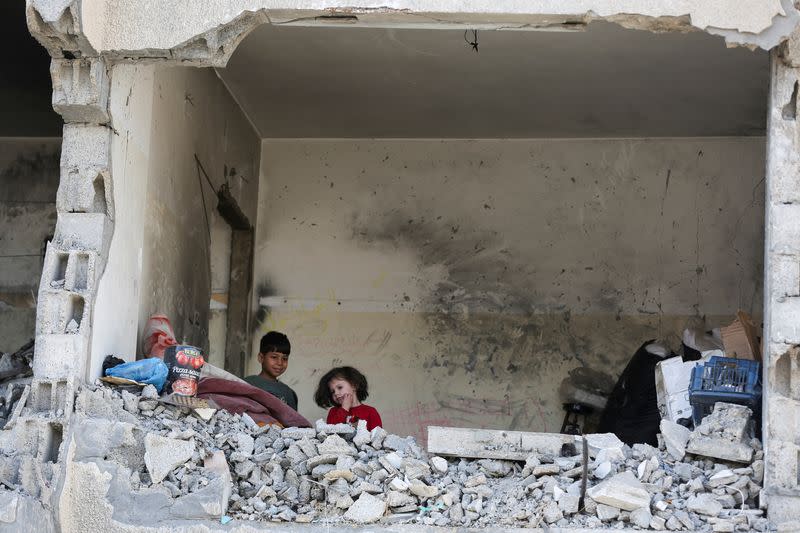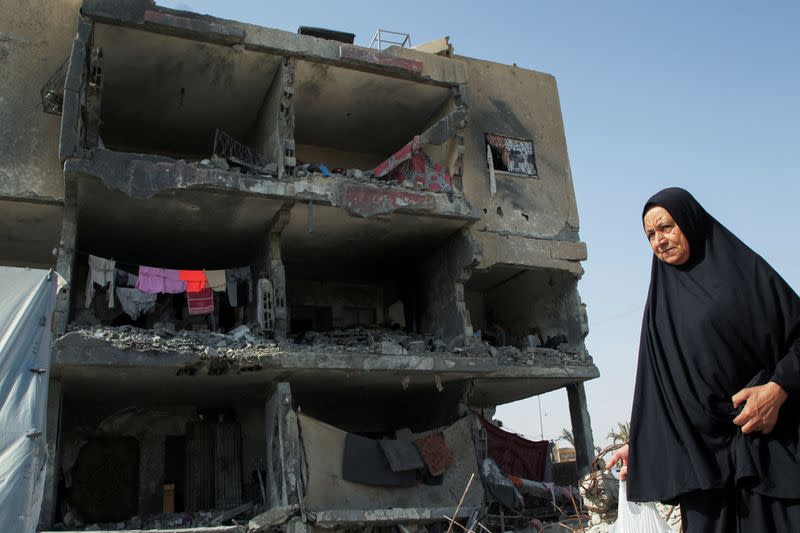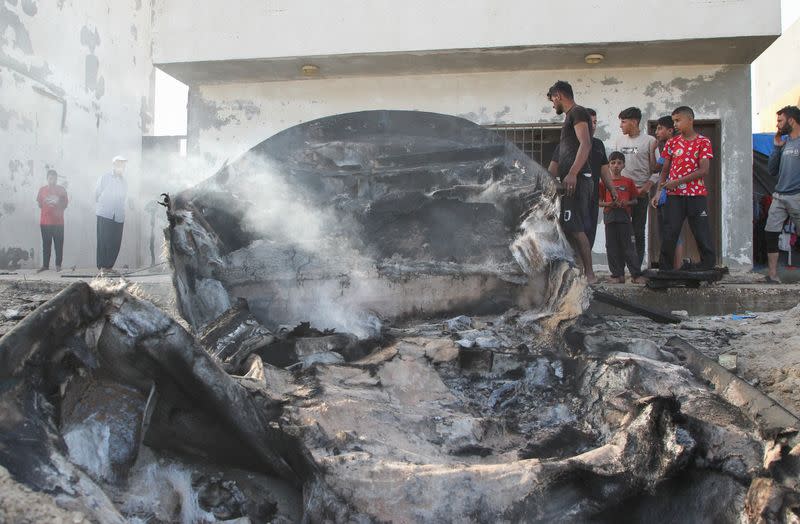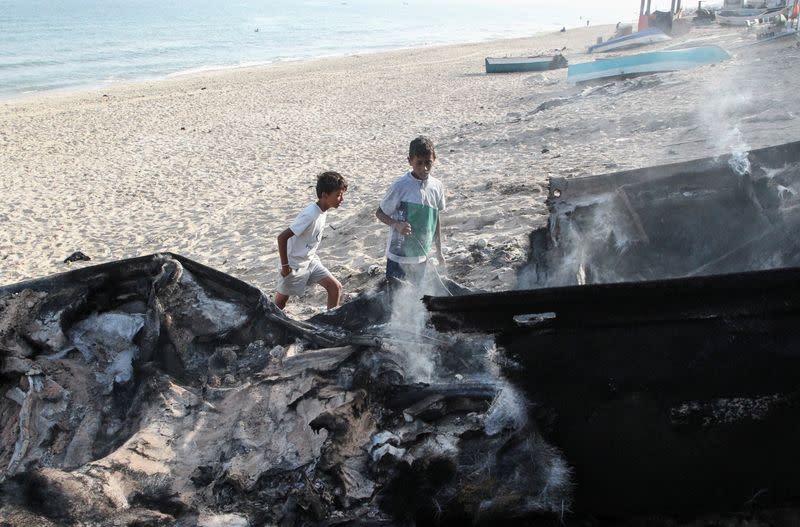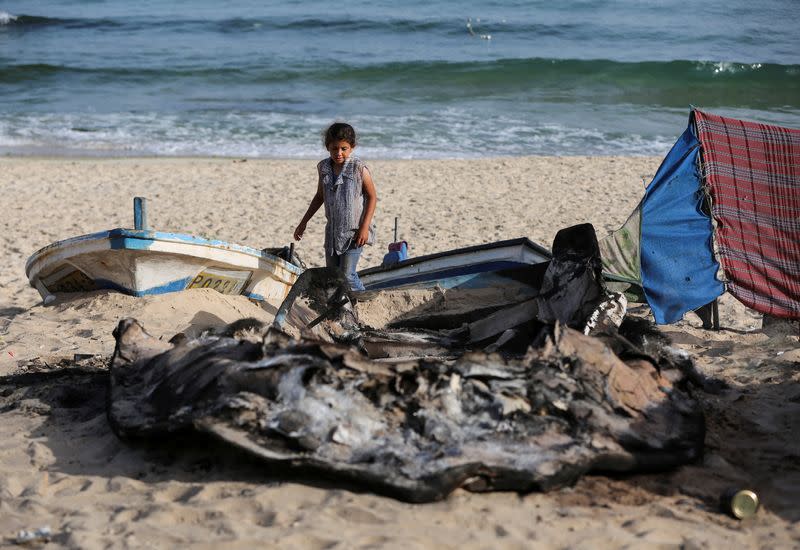Israeli forces move deeper into Rafah in night of heavy battle
By Nidal al-Mughrabi
CAIRO (Reuters) -Israeli tanks advanced to the edge of a crowded district in the heart of Rafah on Wednesday during one of the most intense nights of bombardment of the southern Gaza city since Israel launched its offensive there this month.
Israel's assault on Rafah on Gaza's southern edge has set hundreds of thousands of people fleeing in what had been a refuge for half of the enclave's 2.3 million people. It has also cut off the main access routes for aid into Gaza, drawing international fears of mass casualties and famine.
Israel says it has no choice but to attack the city to root out the last battalions of Hamas fighters it believes are sheltering there. Its troops have been slowly moving into the eastern outskirts of Rafah since the start of the month.
Residents and militants said tanks had taken up new positions on Wednesday further west than before along the southern border fence with Egypt, and were now stationed on the edge of the Yibna neighbourhood at the centre of Rafah. They had not yet entered the district as fighting had been intense.
Hamas's armed wing said it had struck two armoured troop carriers at a gate along the border fence with anti-tank rockets.
Palestinian residents said Israeli drones were firing into the Yibna suburb and had opened fire overnight on fishing boats on the beach of Rafah causing some to catch fire.
"There has been no stopping of Israeli fire all night, from drones, helicopters, warplanes, and tanks," said one resident of Rafah, asking for his name to be withheld to protect his security.
"Tanks made a limited push southeast, still limited but they have advanced under heavy fire all night," he told Reuters via a chat app.
There was no immediate word from the Israeli military on Rafah. It said it had killed a number of fighters in targeted operations in Khan Younis just north of Rafah, and in the northern Gaza Strip where its troops have returned in a major operation in an area where they said they had dismantled Hamas months ago.
UNRWA, the main United Nations agency in Gaza, estimated as of Monday that more than 800,000 people had fled Rafah since Israel began targeting the city in early May, despite international pleas for restraint.
Israel launched its assault on Gaza following a Hamas-led attack on southern Israeli communities on Oct. 7 in which fighters killed 1,200 people and captured more than 250 hostages. Since then, Israel's assault has killed more than 35,000 people, with thousands more feared buried under the rubble, according to Gaza health authorities.
The Israeli military said it had killed a person it identified as Ahmed Yasser Alkara and described as a key Hamas operative, along with two other militants, in a strike in Khan Younis.
"Alkara took part in the Oct. 7 massacre in communities in southern Israel and was a significant anti-tank missile operative who carried out attacks on IDF troops during the war," said the military statement.
The statement also said five other militants were killed and had been operating from inside a school.
In the central Gaza Strip town of Zawayda, an Israeli air strike killed seven people in one house, medics said.
Just after midnight, an Israeli air strike on a house in Al-Nuseirat camp in central Gaza Strip killed eight Palestinians including children, medics said, while another air strike on a mosque, housing displaced families, in Gaza City, killed and wounded several people, they added.
On Gaza's northern edge in Jabalia, the largest of Gaza's eight historical refugee camps, Israeli forces pressed on with a ground offensive that has carried on in parallel with the Rafah assault for two weeks.
Health officials and residents say entire residential districts have been destroyed and dozens of people killed in the operation, in an area where Israel withdrew its forces after claiming to have "dismantled" Hamas in January. Israel says it has had to return to prevent Hamas from re-establishing there.
(Reporting and writing by Nidal al-MughrabiEditing by Peter Graff and Diane Craft)

 Yahoo News
Yahoo News 